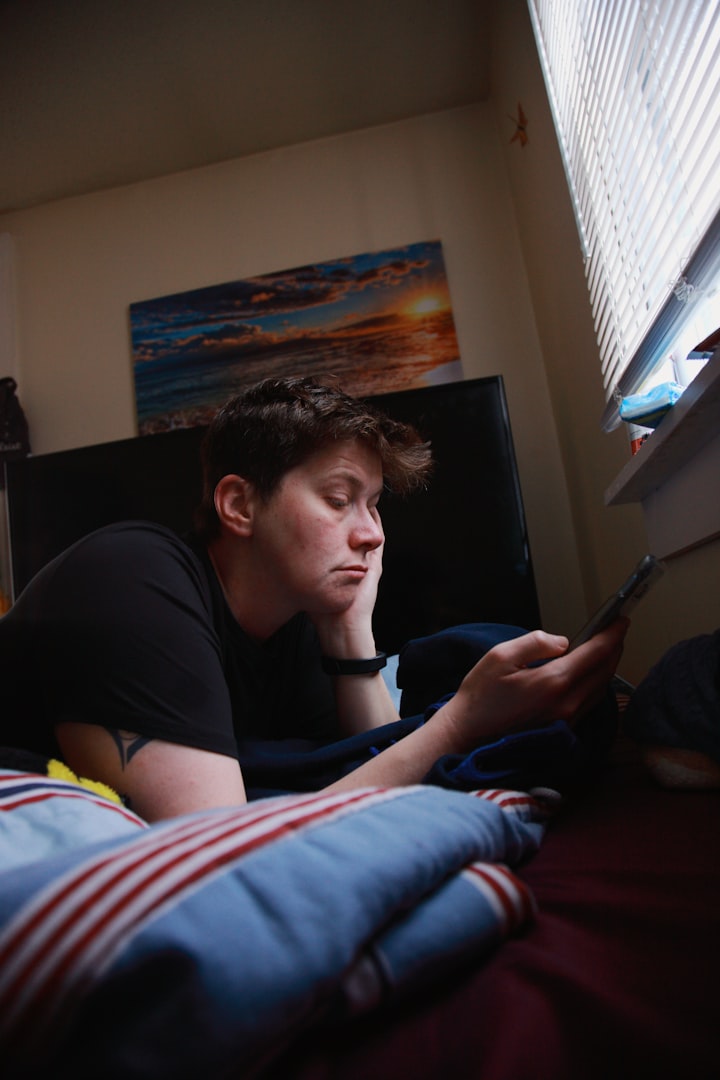Six Lifestyle Changes for Coping With Depression & Anxiety.
Simple changes to your life that can ease symptoms.

When symptoms of depression or anxiety become too much, we visit a doctor. A general practitioner may make general health and lifestyle suggestions, though rarely dig deeper into your diet, exercise, interests, or personal and work relationships, including your connection with devices.
While conventional medicines have produced superior results for treating depression and anxiety, incorporating one of the following treatments into existing medication and therapies could significantly improve symptoms.
--------
1. Reduce social media use.
Research shows young adults with depression and anxiety demonstrated reduced symptoms of loneliness and feelings of isolation through access to friends and support groups on social media.
However, social media and screen time are addictive and excess use can have detrimental effects on depression, anxiety, and related symptoms of memory loss and lowered academic performance.
Behaviors related to social media use, such as late nights, extended lengths of time sitting, avoiding face-to-face interactions, and procrastinating essential tasks, all increase symptoms of both depression and anxiety. In addition, active Facebook activity suggests a tendency toward feelings of social comparison and social envy, both known to cause depression.
Brain scans show regular internet searching reduces functional connectivity of the temporal gyrus and parahippocampal cortex regions, affecting our ability to store and recall specific items in our working memory.

The blue light on our screens prevents the release of melatonin, a hormone with antidepressant and hypnotic effects. Melatonin supports adequate and restful sleep, preventing symptoms of depression and anxiety.
Limiting social media use to a few hours a week and seeking quality rather than quantity in terms of friendships should help strike that balance between connection and dependence.
2. Reduce or quit alcohol, cigarettes, and recreational drugs.
Social media and screen time, alcohol, cigarettes, and recreational drugs are all addictive coping strategies. The latter three have other debilitating effects and are known to contribute to reductions in essential nutrients.
Along with lung and cardiovascular deterioration, slowed blood circulation, and reduced bone density, smoking increases the risk of depression, and depression increases the risk of smoking.
Nicotine stimulates the release of dopamine which is low in people suffering from depression and anxiety. However, chronic use leads to neurobiological changes that adversely affect the release of dopamine and serotonin.
People without alcohol dependency who drink, even moderately, demonstrate increased depression and anxiety, with 63.8% of people dependent on alcohol presenting with clinical depression.
Alcohol interferes with pharmacological medication. For example, studies found a significant positive correlation between drinking and poor responsiveness to fluoxetine. In addition, people with depression that drink are more likely than non-drinkers to discontinue medication and other forms of treatment.
Longitudinal studies indicate that long-term heavy drinking leads to the development of depression through consistent reductions in tryptophan, causing low levels of serotonin, known to cause depression.

Without specialist management, psychotropic medications such as antidepressants, antipsychotics, and stimulants are misused and abused, leading to mood, cognitive, and perceptual alterations along with rage and anxiety.
3. Exercise.
Exercise improves our mental health, boosts self-esteem, reduces stress hormones, releases euphoric endorphins, encourages positive connections, and takes up time from negative ways of coping, i.e., excess sleep, food, smoking, alcohol, or drugs.
The benefits of exercise for people with depression are long-term, with moderate aerobic and non-aerobic exercises showing the most clinically significant results at around half an hour, 3 to 4 times per week.
Studies included walking, running, strength and resistance training, weight-lifting, relaxation, coordination, and flexibility training. Exercise that continued for ten months or longer had results equal to the effects of conventional medication over the same period.
However, being depressed and anxious makes it a lot more difficult to maintain physical activity.
Low dopamine levels, high levels of cortisol and adrenaline, irregular melatonin secretion, mental and physical exhaustion, co-existing health problems, and cognitive and neurological defects in motivation make keeping up a regular exercise schedule even more demanding for people with depression and anxiety.
Starting with small steps helps. When I say small, I mean tiny. I give myself a high five for chucking in the odd squat while washing dishes, or leg lifts watching T.V. I can feel the health and fitness gurus cringing right now.
“Exercise is medicine for depression: even when the ‘pill’ is small.”
4. Get outside and garden.
Getting outside and getting at the lawn and garden is grounding and uplifting. If you don’t have a yard or garden, make your way to a local park or garden centre, buy some houseplants, go to the beach, go for bushwalks, or join local outdoor groups that work in conservation (see Greenify Your Space if you’re in lockdown).
Indoor and urban settings are busy, placing extra effort on cognitive functions. In addition, the wild and expansive set of natural environments creates distance from our ordered and restricted surroundings, giving us the feeling of being away from it all.

The physical activity of gardening and outdoor activities releases endorphins and reduces stress hormones, including adrenaline and cortisol. In addition, vitamin D synthesis from sun exposure decreases the risk of developing symptoms of depression.
Gardening and outdoor recreation have demonstrated improvements in mental health perceptions and cognitive function for veterans with PTSD, students with social anxiety, the elderly in a nursing home, refugees, and many more populations either suffering from or predisposed to depression and anxiety.
5. Mindfulness & meditation.
I briefly discuss how psychological abuse shrinks the prefrontal cortex (PFC) region of the brain here. The PFC is thicker in brain imaging studies of people who practice meditation, mindfulness, and yoga.
Other studies show meditation increases blood flow through the sensory regions and decreases flow through the executive areas of the brain.
Altered states of consciousness obtained through meditation, daydreaming, and alterations cause hypnosis in the PFC and associated regions.

Meditation stimulates the production of dopamine, serotonin, melatonin, and DMT, all known to support people with depression and anxiety; in the same studies, cortisol and noradrenaline, known to aggravate symptoms, were decreased.
I first thought mindfulness was being mindful and present in every moment, that it was as simply bringing yourself back into the present by focussing on what you're doing. There is more to mindfulness, How to Practice Gratitude While Cooking, Doing Laundry, and Commuting explains this well.
6. Reduce high fat, sugar, processed, and takeaway foods.
Suppose most of the foods your parents gave you from birth consisted of fresh fruits and vegetables, nuts, beans, grains, and unprocessed meat. In that case, your basic physiological make-up is already in an excellent position to fight symptoms of depression and anxiety.
A high fat, sugar, baked goods, processed, and takeaway food diet, particularly in the early stages of life, makes the battle against depression and anxiety even more demanding.
I always advocate visiting a naturopath, nutritionist, or dietician. These specialists will look at the broad picture and actively check for nutrient imbalances, blood sugar levels, gut and liver function, and other potential influences on symptoms.
Because anxiety and panic attacks link to increased lactic acid levels, a Naturopath’s primary goal may be to reduce lactic acid by eliminating alcohol, coffee, sugar, and food allergens and correcting B vitamins and calcium deficiencies magnesium.
Gaining popularity, though still underrated, are antidepressant, anxiolytic, and adaptogenic properties of foods and herbs such as spinach, kale, St. Johns Wort, passionflower, licorice root, and Panax ginseng. A registered Herbal practitioner, Naturopath, and Nutritionist can provide personalized diet and herbal treatments.
--------
There are many barriers to taking up some of the above options, particularly those suffering from chronic depression and anxiety.
Researchers continue to try to find ways to overcome these cognitive-behavioural, psychosocial, and neurological obstacles.
In the meantime, if you can ease your symptoms and make small changes toward achieving any one of the above, your chances of reducing the frequency and severity of symptoms of depression and anxiety will be much greater.
Thanks for reading.
You may also enjoy:
About the Creator
writemindmatters
Writing about all matters of the mind, narcissism, personality disorders, parenting, writing, naturopathy, nutrition, and hopefully chapters from fantasy books I'll one day write.






Comments
There are no comments for this story
Be the first to respond and start the conversation.